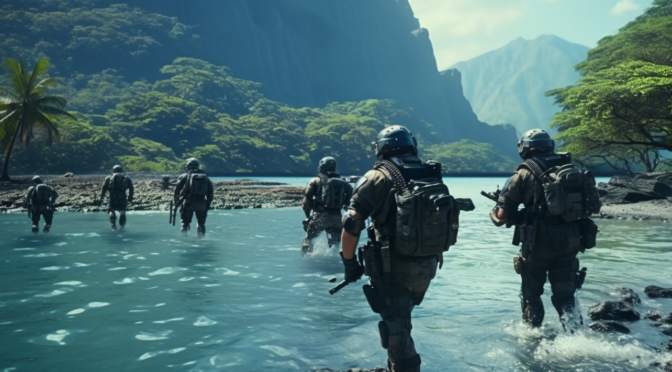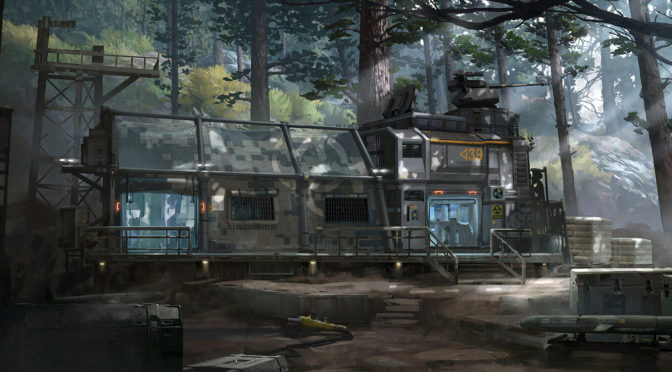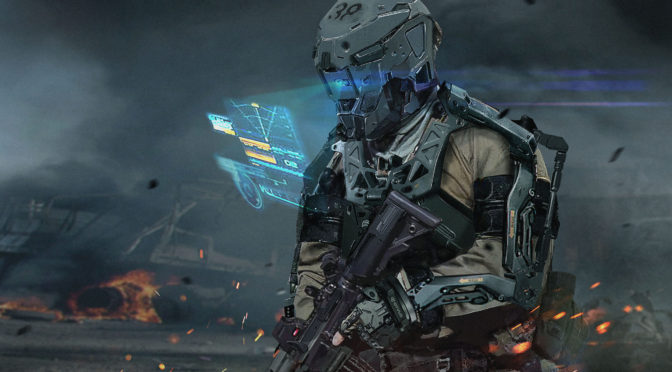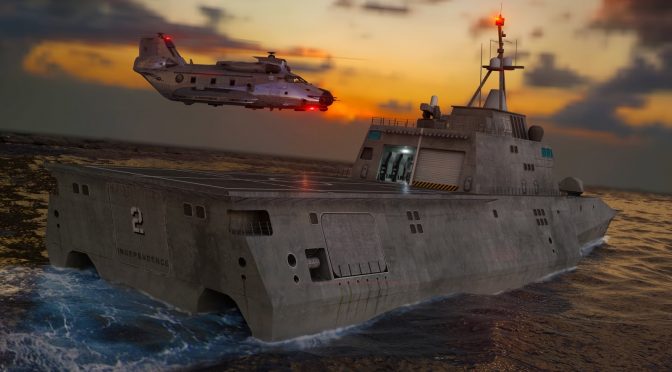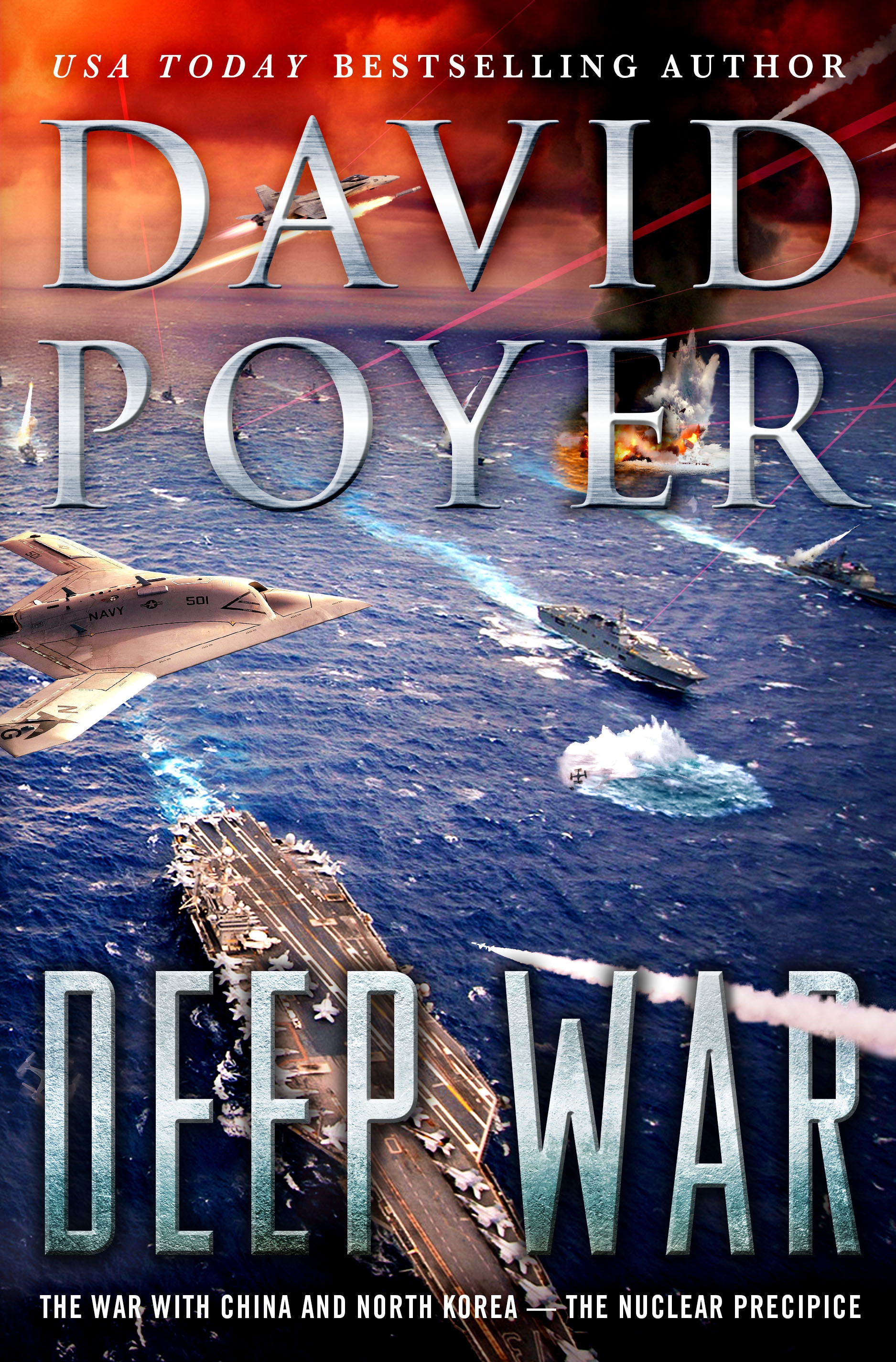By Major Geoffrey L. Irving, USMCR
Smoke twisted slowly out of a burnt crater, listing sideways in the gray light of an overcast dawn. A gentle breeze caught the twist and wafted it downwind. To Staff Sergeant Ron Garcia it smelled familiar – sweet petroleum mixed with the acidic charred aftertaste of high explosive. He’d made it through another long night of missile strikes. The Staff Sergeant sat against the wall of his subterranean command post, watching the waves of the South China Sea while tracing the edges of his battered tablet with his finger. Soon, he’d have to go check the men and the gear, but he hesitated in a moment of quiet. He looked at his watch, it was May 5, 2040. The war had been going on for eight years. Eight years seemed too long, and he was tired.
Staff Sergeant Garcia was lean, with hunched shoulders that implied a coiled tense energy or intense fatigue depending on the light. He wore a bleached uniform that hung loosely on his frame. He had been out in this stretch of islands for nearly eighteen months making sure his motley team of Marines, soldiers, airmen, and local auxiliaries stayed focused and stayed alive. In that time, he’d never seen the enemy. What a way to fight a war.
A thick mass of low-slung clouds started to roll in, washing the island in a wet mist. “Perfect,” he thought to himself. He popped to his feet and walked back into the cave, quickly gulping a mouthful of water and a couple bites of stale protein bar. The other occupants of the CP slowly emerged.
“You running a check? SATCOM is still working, but landline is down after last night,” said Senior Airman Brenner, with bloodshot eyes and similarly loose-fitting fatigues.
“Yeah, I haven’t heard anything in a couple of hours so I’m going to go check on the Lieutenant and try to get a line to the big island. Get the power back on and go check the shoreline to see if we got any new deliveries. Leave Desmond here with Santo to monitor the SATCOM and watch the beach. I’ll be back before sunset.”
Slinging his rifle behind his back, Staff Sergeant Garcia checked the battery on his tablet and picked up a handheld radio before heading out the door.
As he left the mouth of the cave, Garcia pushed aside wire netting and instinctively looked up to scan the sky. With bounding strides, he walked downhill, following a beaten path into the remains of the fisherman’s outpost on the beach. The structures, rusted from neglect and punctured by fragmentation, were a reminder of the days before the war went hot – when it was sufficient to hold territory with flags and legal claims rather than Marines and steel. Despite appearances, they still managed to hide a missile launcher in the remains of the concrete block fisherman shelter.
Garcia moved South along the rocky shore. The beach quickly ran out and he resorted to hopping across black volcanic rocks. This island was barely a mile long, so he didn’t have far to go. Another shallow bay emerged. Garcia turned inland and started the climb to one of the three sheltered outposts on the island. As he climbed, his nose twitched again as the smell of sweet petroleum and acidic char returned. The Marines had a launch site here on the windward side of the island. It was a good site, sheltered from direct overhead reconnaissance but with a commanding view of the sea to the West. The Lieutenant had taken a rotation here to spend some time with the guys.
Quickening his pace, Garcia turned a corner around two large boulders into the rocky platform and stopped in horror. Everything was black and smoking. His stomach dropped as he rushed to the twisted remains of his Marines. They were pushed up against the rough walls and cold to touch. The Lieutenant slouched near the edge of the platform, his jaw hung slack and loose against his chest. On the other side, Corporal Reston lay face down, his limbs splayed at acutely unnatural angles.
“Goddamn it,” Garcia breathed out quietly, touching the Lieutenant’s cold shoulder.
Looking up from the Marines, he assessed the launchers and missile stockpile. Like the Marines, the equipment was charred and twisted. The stacked missiles were toppled or burnt while the launcher showed gashes and pock marks where it must have been punctured by tungsten. He found the Lieutenant’s faded ball cap and stuffed it in a cargo pocket.
To get to the other launch site, Garcia had to cross over the island’s ridge. Luckily, the clouds still hung low and shrouded him from the sky. There was little foliage to speak of so walking across the ridge was always a risk. Garcia instinctively hunched down and ran across the island.
He dropped down to the leeward side, slipped and nearly tumbled into Corporal Masterson and Lance Corporal Hubert huddled in their hole. This site was sheltered on three sides by jagged vertical rocks that stuck up out of the ocean like fingers. Masterson tried to catch Garcia and gave him a hand down into their shelter. Garcia took a seat next to them.
“You guys OK?” He asked.
“Yeah, although they seemed angry about something last night,” Masterson said with a grin.
“That’s why I need you to keep it locked in today. How’s your gear?” Garcia asked.
“Missiles are dry. Drones are charged and ready. Ammo is the same as it always is. Targeting diagnostics are all green gumballs. Could use some new items on the menu, though.”
“Got it. Just be thankful you’ve got a menu,” Garcia grumbled, as he looked out from this natural bunker at the East side of the island and the Philippine Sea.
“The Lieutenant and Reston are dead. Comms are down, but I’ll get them fixed soon,” Garcia continued.
The Marines followed Garcia’s gaze out to the ocean.
“I’m ready to go home,” said Hubert.
Garcia spent the rest of the day checking on assets sprinkled around the island. He recalled a story he read growing up – of Robinson Crusoe washed up on a deserted island in the middle of the sea. Crusoe had built shelter, sowed crops, and befriended a native man named Friday. Except for cannibals, it sounded like a grand adventure. When Garcia was first dropped off on the island he had felt like Crusoe, but that feeling was long gone.
This island got nearly everything from the sea. Garcia walked along the leeward side and came to a camouflaged concrete box nestled in the rocks above the high-water line. He popped off a metal manhole cover to reveal the hardware inside. The contents of the box were their lifeline to the cabling that connected them with Luzon and brought them consistent electricity. This box charged their batteries and was the network switch for their wired communications connecting the CP to each launch site.
Talking over radio was possible. Talking over SATCOM was possible. But, this close to the PLA Navy, even a radio squelch invited a missile or a drone while wired communication stayed out of earshot and only suffered from a busted wire here and there. So, they used old school wire to talk and only monitored SATCOM to receive critical tasking.
About a quarter mile offshore was an array of submarine batteries installed on the floor of the island’s shelf that pulled energy off the telecommunications line, converted it, and fed it into this box. That was enough power to keep them going indefinitely.
The box was humming and its contents were intact. Garcia connected his tablet into a port and watched the screen. He reviewed diagnostics for the battery systems, the subsea cable line, and the cable line’s sensors. Then, he got on the net, authenticated his crypto, and typed a quick message:
“ROWAN3, FRESNO9. SITREP. PLA-N MISSILE ATTACK. 2 KIA. 1 LAUNCHER DESTROYED. SITUATION WELL IN HAND.”
Garcia’s island was a small but important outpost. The Company was based on the “big island,” which was a misnomer because the “big island” was only five miles long. There were detachments manning other small outposts on outlying islands, but Garcia’s was the northernmost, meaning they had the greatest range but were also the most exposed. The Marines and missiles sprinkled around the Philippine Sea were meant to deny the PLA Navy freedom of operation in these constrained waters and augment the combat capacity of the waning US Navy surface fleet.
Garcia saw an alert flash on his screen for an inbound message.
“FRESNO9, ROWAN3. ACK. BE ADVISED. INCREASED PLA-N SURFACE/SUBSURFACE ACTIVITY ANTICIPATED IN AO. HOLD CURRENT POS DESTROY ANY EN OVER II THRESHOLD. RELIEF AS SCHEDULED NOT BEFORE.”
“Shit.”
As dusk was beginning to set in, Garcia hurried back into the CP. He saw Santo Biyernes, a big island local who served as an auxiliary member of their unit, unpacking a number of large waterproof bags lined up against the wall, and exclaimed with relief.
“What did we get!?”
Santo turned around and smiled a welcome as Brenner walked out from the tactical operations room.
“Mostly food. But also two new tube-launched drones, a couple of replacement satellite arrays, and de-sal kits. I saw the boat caught out in a reef, so I got a little wet dragging it in.” Brenner said, swelling with pride as if he were a hunter who had killed his meal instead of dragging in one of the thousands of surface maritime drones that were slowly but surely supplying the static island campaign.
“Awesome. Are comms up? I think it’s just a wire shunt.”
“Yeah. I found the shunt and patched it. We’re up. I saw a message came in, but couldn’t read it.”
“I have it here,” Garcia said, raising his tablet. “Red is coming our way in a big way and we need to be ready.”
“Where’s the Lieutenant?” Brenner asked, wide eyed.
“He got hit last night, but we’re going to get ours tonight.”
With communications re-established with Masterson and Hubert on the leeward side of the island and the rest of the Company on the big island, Garcia leapt into action. He needed to find the enemy.
Each of the missile sites had a number of rotary and tube-launched fixed wing drones equipped with sensor arrays to identify enemy ships and guide missiles into them. Garcia got the long-range drones into the air and traveling west to the vicinity of known sea corridors. He didn’t have to worry about controlling them because their AI understood the mission.
Garcia had been an artilleryman for the better part of two decades. As he booted his reconnaissance and targeting systems up, he thought about how much his tools had evolved. He was first trained on rudimentary and temperamental AFATDS fire control software on the Oklahoma plains, then on the KillSwitch mobile app in the California hills. Now, seated on a makeshift bench hunched over two screens, Garcia activated the distributed acoustic sensor suite along his island’s subsea cables. In addition to a single connection between his island and the big island, the cable was festooned along the coastline. This festoon created multiple redundant cable landing access points and also allowed Garcia to monitor the depths of the sea around him. On his other screen, he received video feeds from the aerial drones. He now had eyes and ears in the sky and the sea.
With the missiles loaded and activated, he called his Marines back to the CP. Masterson and Hubert shuffled in with a renewed sense of urgency and purpose. Masterson took a seat next to Garcia while Hubert quickly pulled the .50 caliber machine gun from the recesses of the cave and set it to cover the bay. Corporal Masterson and Lance Corporal Desmond monitored launcher diagnostics on their own tablets while keeping an eye on Garcia. Now it was a waiting game.
“We’re looking for anything over threshold two, so more than 7,000 tons. That means we’re looking for Type 61 or 57 destroyers, or even an old Type 55 Renhai if we have to settle,” Garcia muttered as he watched images from the airborne drones pop up on his feed.
The small fleet of drones, both from Garcia and the rest of the Company on the big island, communicated with each other and coordinated their search path. They had cues about where the enemy fleet was likely steaming from and where they were likely steaming to, so their AI could anticipate the likely path. Sure enough, well into the night, the first targets began to materialize on Garcia’s screen.
Garcia saw the highlighted outline of a Type 61 destroyer appear and felt a wave of adrenaline flush into his bloodstream. His fingers tingled and shook as the drone cycled through different sensor spectrums to identify the vessel.
“Standing by to fire, Staff Sergeant,” one of the Corporals whispered, dripping with anticipation.
“Alright. Relax. We have to wait until we identify more, and the AI matches us,” Staff Sergeant Garcia soothed. Firing at the first identified target would spoil the surprise. They would have to wait for the AI to calculate the ideal flight path of each of the Company’s launch sites, match their launcher to the right ship, and deconflict through the Navy’s antiquated JADC2 targeting network. Garcia hoped the AI would do its job right.
Another tense 20 minutes passed. The number of targets acquired was quickly growing. After finding the first ship, the AI could easily anticipate the enemy’s order of battle. It seemed obvious that the PLA Navy fleet was heading directly for the US Fleet at Camilo Osias Naval Base under cloud cover and darkness. With few U.S. Navy surface ships in the South China Sea, they must’ve felt uncontested.
Then, the target list abruptly started to shrink. Garcia stared at his screen, growing impatient and increasingly concerned with each passing minute as images blinked off the screen, targets fell off the list, and yet he had not received an order to launch.
“What the hell, Staff Sergeant?” one of the Corporals muttered.
Garcia was at a loss. His team was ready. They had done everything right. The list had been full of ripe targets – lumbering surface vessels with meager defenses just begging for a naval strike missile. A target allocation to his team would have justified his last eighteen months of semi-starvation. It would have justified the daily battle drills that he had forced his team to sweat through in full PPE over and over again. It would have justified eighteen months away from his wife and two daughters, who he was scared wouldn’t recognize him when he came home. It would mean that the Lieutenant’s missing jaw and Reston’s shattered limbs would have had a purpose – a purpose other than fulfilling some General’s wet dream of what the new Marine Corps should be. Tears welled up in Garcia’s eyes as he clenched his fists and tried to stop himself from screaming.
The target list dwindled down to vessels below their threshold – tenders, minesweepers, ammunition boats. There must be something wrong with his systems. He tested the connections, running his shaking fingers over each wire and port. Nothing.
Garcia looked at the screen of his cable sensing system. The diagnostic dashboard showed no problems. Then he looked at the time in the corner of the screen. It read 9:47pm. The screen had been frozen for hours. Garcia furiously grabbed the tablet, closed out of its programs and restarted. The boot procedure stretched on for what felt like eternity. As the cable sensing system came online, the acoustic disturbances in the water surrounding the subsea cables north of his island gave him a clear picture.
“It’s CV-35!” CV-35 Shaoshan was the PLA Navy’s cutting-edge aircraft carrier. She was escorted by a pair of destroyers and an amphibious ship and seemed to be making a quiet run around the southern tip of Taiwan to break out of the first island chain into the Philippine Sea.
“AI must have known CV-35 was missing!” Garcia cried out.
The AI finished its calculations, reorienting the remaining missiles from Staff Sergeant Garcia’s launchers to target CV-35, and flashed a message to Garcia.
“Fire.”
Geoffrey Irving works for the Department of Commerce’s Bureau of Industry and Security identifying and addressing vulnerabilities in information and communications technology supply chains. Geoff previously served on active duty with the U.S. Marine Corps and currently serves in the U.S. Marine Corps Reserve. Geoff is a graduate of Tsinghua University College of Law and writes about the national security implications of economic and technological competition.
Featured Image: Art made with Midjourney AI.

